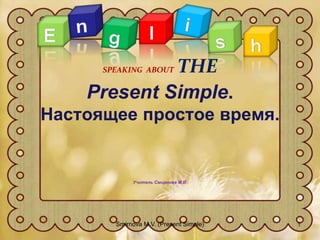
Present Simple1.ppt
- 1. Present Simple. Настоящее простое время. Учитель Смирнова М.В. SPEAKING ABOUT THE 1 Smirnova M.V. (Present Simple)
- 2. Мы употребляем Present Simple (простое настоящее время): 1. когда говорим о действиях, которые происходят часто, регулярно, обычно, постоянно. My mum goes to work every morning. 2. Для выражения общеизвестных фактов. Dogs run and rabbits hop. We use the present simple for: 1. daily routines, repeated actions or habits. I get up at 7 o’clock every day. 2. permanent states. I live in Moscow. 2 Smirnova M.V. (Present Simple)
- 3. Указатели времени (сигналы) / Time Expressions:) every day / week / month / summer/ year - каждый день / неделю / месяц / лето / год every morning / afternoon / evening - каждое утро/ день / вечер In the morning / afternoon / evening - утром / днем / вечером On Monday / Friday / Sunday - в понедельник / пятницу / воскресенье Once / twice / three times a week/ a day - один раз / два раза / три раза в неделю / в день usually - обычно always - всегда sometimes - иногда often - часто 3 Smirnova M.V. (Present Simple)
- 4. Мы образуем простое настоящее время с помощью подлежащего ( существительного или личного местоимения) и глагола. We form the present simple with the subject (noun or personal pronoun) and the verb. ( + ) I You We They . V. BUT: She He It Vs/es The third person singular takes –s or es 4 Smirnova M.V. (Present Simple)
- 5. Polar bears live in cold places. They live in the North Pole . They eat fish. Ann likes roses. She spends a lot of time in the garden. 5 Smirnova M.V. (Present Simple)
- 6. Заполни таблицу глаголами в нужной форме. I play dance go watch fly You He She It We They s s s s s s es es es es es es play play play play play play dance dance dance dance dance go go go go go go watch watch watch watch fly flies flies flies fly fly dance watch watch 6 Smirnova M.V. (Present Simple)
- 7. Особенности правописания глаголов в 3-ем лице ед. ч. 1. К большинству глаголов мы прибавляем -s Most verbs take –s in the third person singular. I sing - She sings I read - He reads I sleep - It sleeps 7 Smirnova M.V. (Present Simple)
- 8. 2. К глаголам, которые оканчиваются на –s,-sh, -ch,-x,-o, мы прибавляем -es Verbs ending in –s,-sh,-ch,-x,-o, take -es I go - He goes I watch - She watches 8 Smirnova M.V. (Present Simple)
- 9. 3. К глаголам, которые оканчивается на согласную + -у, мы прибавляем –es при этом –у меняется на –i. Verbs ending in a consonant + y, drop the –y and take -ies I study - He studies I fly - It flies Verbs ending in a vowel + y, take -s. I play - He plays 9 Smirnova M.V. (Present Simple)
- 10. Говорим правильно! Произноси окончание –s/-es так: 1.После глухих согласных звуков - [ s ] hops, cooks, eats, sits, 2. После гласных и звонких согласных звуков - [ z ] rides, goes, cries, brings 3. После [ s ], [ ks ], [ ∫ ], [ t∫ ] - [ ız ] kisses, washes, watches, 10 Smirnova M.V. (Present Simple)
- 11. ( - ) Мы строим отрицательные предложения при помощи вспомогательного глагола do и отрицания not. Для 3-го лица ед.ч. мы употребляем вспомогательный глагол does и отрицание not. При этом к смысловому глаголу окончание не прибавляется. In the negative forms we use the auxiliary verb don’t with I, you, we, they and doesn’t with he, she, and it. Отрицательная форма Полная форма Сокращенная форма I /You do not don’t go. She / He / It does not doesn’t We /You / They do not don’t 11 Smirnova M.V. (Present Simple)
- 12. I You We They don’t V. She He It doesn’t V . К смысловому глагoлу окончание – s не прибавляется!! S I don’t like jam. . He doesn’t go to school on Sundays. 12 Smirnova M.V. (Present Simple)
- 13. ( ? ) Мы строим вопросительные предложения при помощи вспомогательного глагола Do / Does, который ставим в начало предложения. К смысловому глагoлу окончание – s не прибавляется! In the interrogative forms we use the auxiliary verb do with I, you, we, they and does with she, he, it. ! We don’t add – s to the main verb when it appears with does! I You We They Do V? / She He It Does V ? s 13 Smirnova M.V. (Present Simple)
- 14. Краткие ответы. / Short answer. In short answer we only use Yes or No, the subject pronoun (I, you, he, she …) and the auxiliary verb do / does or don’t / doesn’t. We don’t repeat the main verb. Do you …. ? Yes, I / we do. No, I / we don’t. Does she / he / it …..? Yes, she / he / it does. No, she / he / it doesn’t. Do they ….. ? Yes, they do. No, they don’t. 14 Smirnova M.V. (Present Simple)
- 15. Do you like football? Does a cat eat leaves? Do doctors work in a school? Does a fly fly? Do giraffes climb trees? 15 Smirnova M.V. (Present Simple)